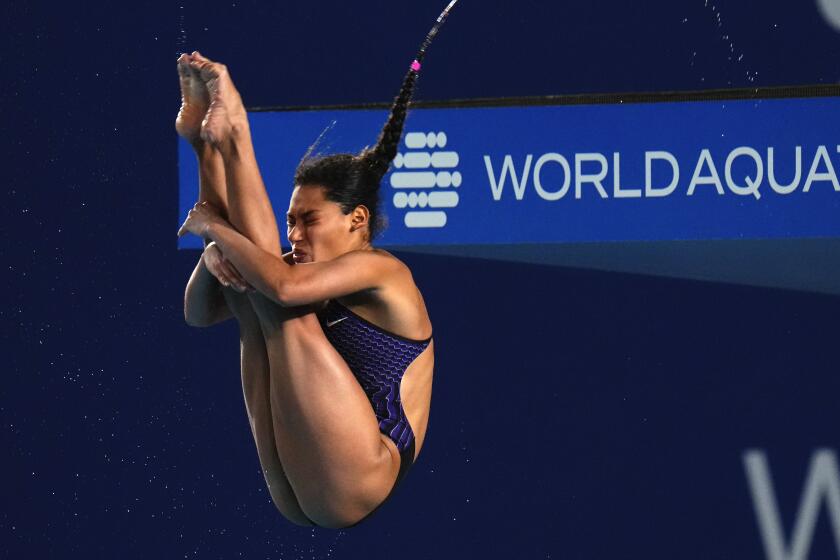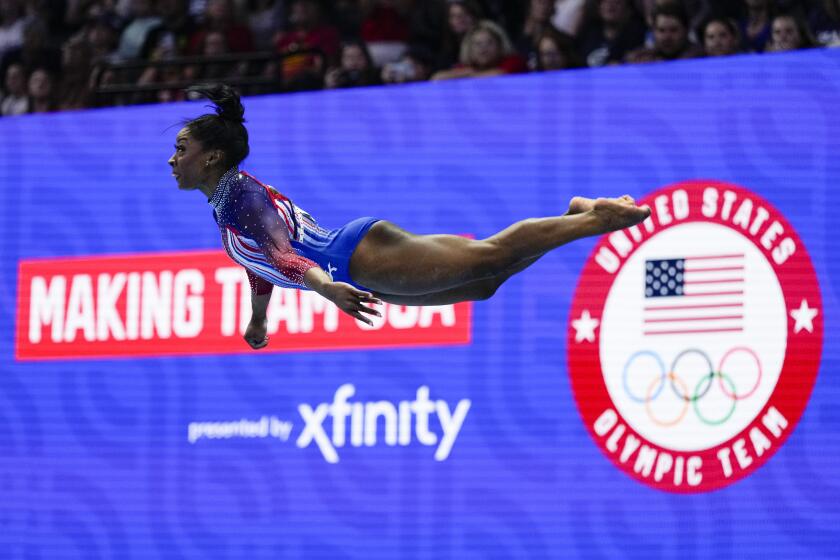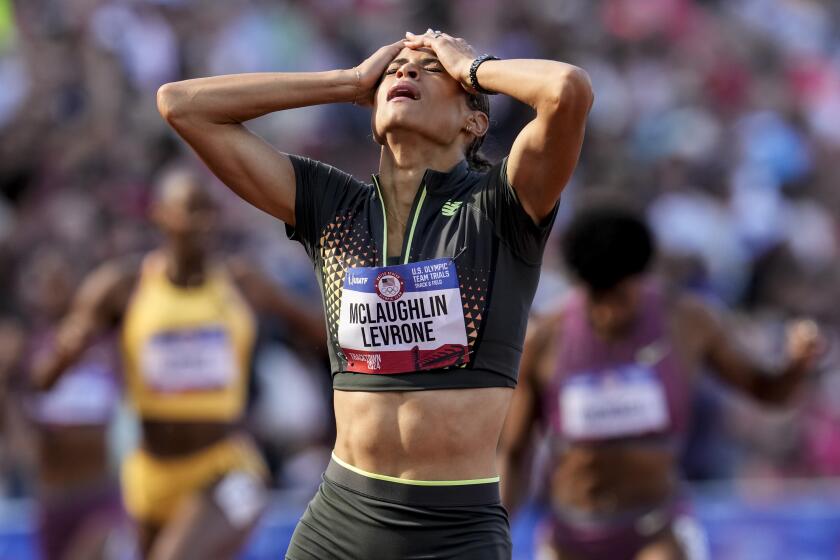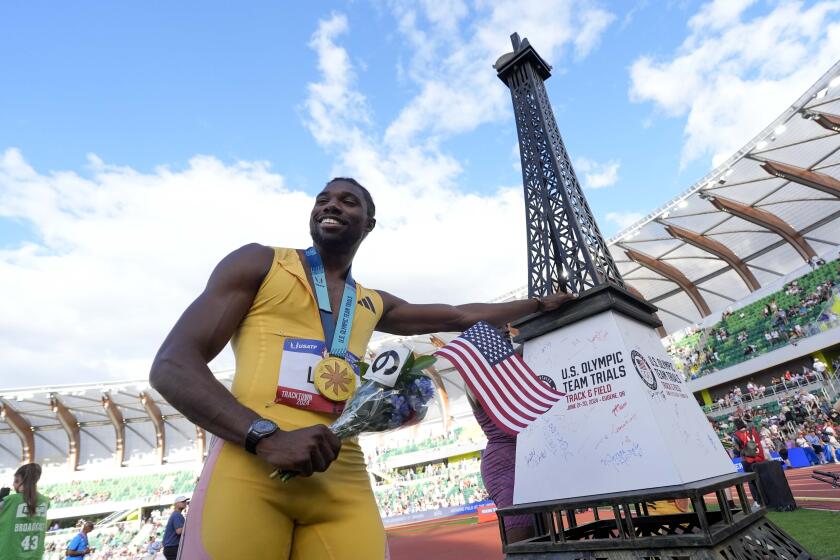Button Has Never Been Known to Zip His Lip
It was a Dick Button moment. Irina Slutskaya was skating a sloppy final long program at the International Skating Union Grand Prix finals. Her arms were flailing, her landings were imprecise, her movements choppy.
Button, doing television commentary, blurted out, “That’s an ugly position.”
His comment was repeated to him later, incorrectly as, “That’s an ugly, ugly position,” Button summoned his considerable authority and said, “That is wrong. I only said ‘ugly’ once. And it was an ugly position.”
Button, 72, is back on television and in full voice. A year after suffering a bad fall while skating in preparation for an exhibition, Button will be at Staples Center this week, giving his unfiltered, unfettered, considerably educated opinion for ABC.
Television viewers love Button. Or hate him. There is an Internet site that promotes a drinking game patterned on one called “Hi, Bob.” People watched old episodes of “The Bob Newhart Show,” and took a drink whenever someone on the show said “Hi, Bob.”
The “Hi, Dick,” game offers Button fans the chance to chug on cue for any number of Buttonisms: when he criticizes a skater for being unmotivated, when he uses the word “nice” or the phrase “first rate.” According to the rules, everybody also drinks if Button says, “ How nice!”
Button laughs about the game. He knows that people remember some of his most famous moments, such as the time he commented--as Angela Nikodinov skated onto the ice--that when Nikodinov skated, it was “a good time for a refrigerator break.”
His broadcast partner, Terry Gannon, responded by asking Button to bring him a beverage.
“I don’t think you get that on any other broadcasts in any sport,” Gannon says. “Those are one-of-a-kind moments.”
Button has no memory of his accident, which happened Dec. 31, 2000.
“Last thing I remember, I was doing a back outside loop, change loop. I do remember saying to myself, ‘I need to do some forward jumps,”’ he says.
While recovering from his head injury, Button suffered an infection. He prefers not to talk about his rehabilitation other than to say, “It was a long and complicated process and now I feel wonderful.”
Button also says his recovery was “an eye-opening experience, a life redefining experience. I think more clearly about many things. Every day is more important. What I went through makes one feel like telling people you love them now. I’ve vowed to be kinder, have a more tender heart. But I will still be critical of skaters.”
Slutskaya knows about that.
Gannon, a good college basketball player at North Carolina State, thinks that if the athletes criticized by Button listen and learn, they will be better skaters.
Peggy Fleming, another broadcast partner and a pretty fair skater herself, says she understands how Button does come off sometimes as mean-spirited.
“But Dick is always trying to criticize in a constructive way,” she says. “If you are smart enough to listen, you will learn. He never tries to be hurtful. But some people do take criticism better than others.”
Most of this generation of figure skating fans know Button only for his acerbic TV work, but Fleming calls Button “the father of our sport,” for good reason.
Button was a seven-time national champion, five-time world champion and a two-time Olympic gold medalist--1948 and 1952. At the 1948 Games in St. Moritz, Switzerland, he became the first skater to complete a double axel in competition. In 1952, as a Harvard senior, he became the first man to complete a triple jump--a triple loop--in competition. Button has a law degree from Harvard and started his own production company, Candid Productions, which created the World Professional Figure Skating Championships.
So when Button once said of Canadian skater Kate Robinson, “Now, isn’t she the quintessential pre-Raphaelite heroine?” he knew how a pre-Raphaelite heroine would look. And if the rest of us didn’t, it would be a good reason to look up pre-Raphaelite heroines, wouldn’t it?
And when Button said during a rather shaky performance by Michelle Kwan, “Oh, she popped her triple into a single and had trouble on her axel landing, but, who cares? Isn’t she just wonderful?” it’s hard not be equally enthusiastic. After all, Dick said so.
Peter Carruthers, a former champion pairs skater with his sister, Kitty, who now joins Button in the television booth, says that he would never be quite as blunt as Button but adds, “What would skating be without Dick Button? At times, yeah, I kind of crack up. You never know what will come out of his mouth. Then he’ll say something and I may have been thinking the same thing. I’d never have the nerve to say it.”
Carruthers says Button is a man of strong, well-informed opinions:
“With Dick, there is no gray area. Dick has his own interpretations and he is at an age, and with the lifetime of experiences, which just lets him open the floodgates. Like it or not, right or wrong.”
Gannon says he never tries to take the edge off anything Button says.
“I react honestly to what he says. There is, for Dick, no filter between what he thinks and what he says. In any given meeting we have, there is a point where Dick erupts into an honestly passionate discourse about the sport and the people in it. He cares so much about the sport,” Gannon says.
Carruthers, Fleming and Gannon agree on one thing: Button doesn’t like mediocrity.
Curt Gowdy Jr., producer of ABC’s figure skating coverage since 1988, says that Button has “a love-hate relationship” with the viewers.
“Some find Dick too condescending, too negative,” Gowdy says. “But that’s Dick being honest. And let me tell you, honesty is a rare trait, not often found in broadcasting. And that’s what makes Dick truly different, truly refreshing.”
On a recent trip, the ABC crew was in the Detroit airport. Gowdy says that Doug Wilson, the program director, had met two women. “When they heard what Doug did, they promptly told Doug that they disliked Dick because he was too frank and honest,” Gowdy says.
“So Doug tells the ladies to wait a minute, he has someone he’d like them to meet. Then Doug comes and gets Dick and tells him two of his fans want to meet him. Doug introduces Dick to the ladies and they immediately tell him, ‘Oh, Dick, we just love you.’ We all laughed.”
As the crew gets ready to assemble for the U.S. Figure Skating Championships at Staples Center, Fleming says that all the broadcasters are happy.
“We were worried a bit,” she says. “Dick was very sick, very sick last year. But he did pull through, and what we have now is a nicer and improved Dick. In reality, he’s a big-hearted, sweet man. He still has so much life and energy and passion for our sport.”
Even if you think Button talks too much, is too negative, too know-it-all, when Button is away, the sport suffers. His voice, deep and authoritative, elevates figure skating. He is like Charles Barkley, making it worthwhile to tune into the broadcast just to hear some real opinions, some honest feedback. Button can make us mad, make us laugh--but most of all he teaches us something about skating. And sometimes even something about pre-Raphaelite art.
*
Diane Pucin can be reached at diane.pucin@latimes.com.
Go beyond the scoreboard
Get the latest on L.A.'s teams in the daily Sports Report newsletter.
You may occasionally receive promotional content from the Los Angeles Times.



